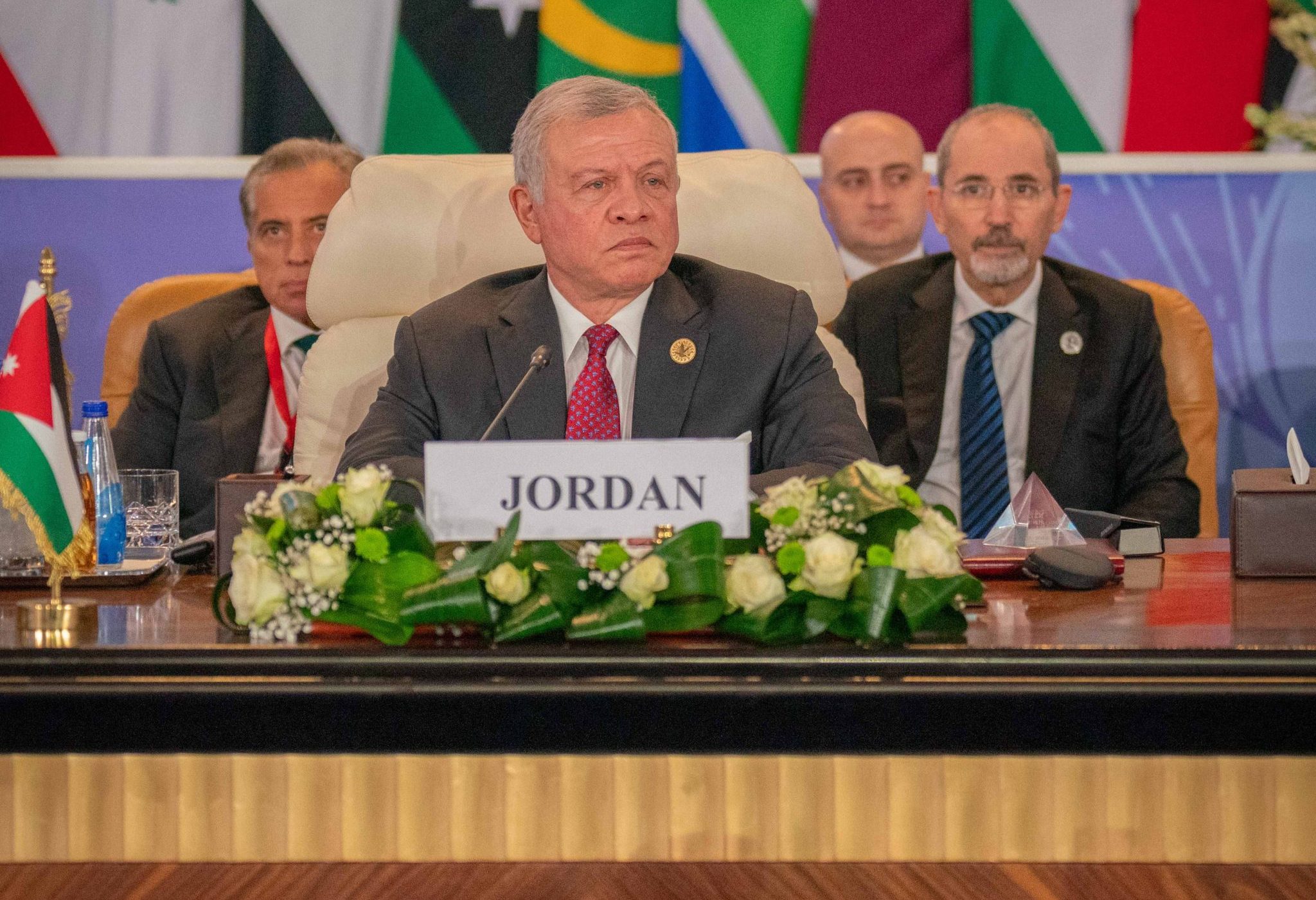King Abdullah’s Gulf tour comes amid growing concerns over the war in Gaza becoming a much wider regional conflict that would affect neighbouring Lebanon and Jordan.
Jordan’s King Abdullah II is heading to Qatar this week as part of a Gulf tour as Amman scrambles to reach a truce in Gaza amid fears of a war spreading to the rest of the region.
The Jordanian king’s visit started off on Tuesday night in the United Arab Emirates, where he met with President Sheikh Mohamed bin Zayed Al Nahyan, the Royal Hashemite Court (RHC) announced.
King Abdullah is then scheduled to visit Bahrain and Qatar in the coming days, though the RHC made no mention of the date of his upcoming travels.
Jordan, together with Qatar, has been at the forefront of talks aimed at reaching a ceasefire in Gaza. On October 12, just days after Israel waged war on Gaza, King Abdullah held a phone call with Qatar’s Amir Sheikh Tamim bin Hamad Al Thani to discuss developments on the ground.
The Jordanian leader travelled to Doha in January when Israel had intensified raids in the Al Aqsa Mosque, suggesting possible discussions between the two countries to halt violations at the time.
Regional analysts said the January meeting possibly involved a discussion on the Hashemite custodianship of holy sites in Jerusalem. Jordan has been the custodian of Muslim and Christian holy places in Jerusalem since 1924 under what is widely known as the “Hashemite Custodianship”.
The Hashemite Kingdom was the second in the Arab world to establish ties with Israel under the Wadi Araba Peace Treaty—named after the southern border crossing, guaranteeing the former the restoration of its occupied areas of Al-Baqoura and Al-Ghumar.
Despite Amman’s ties with Tel Aviv, the former has appeared to take a hard stance against Israel since the beginning of its deadly war on Gaza on October 7.
Since the start of the war on October 7, Israel has killed at least 8,796 Palestinians, including 3,648 children .
Addressing the Cairo Peace Summit last month, King Abdullah started off his remarks by slamming the “collective punishment of a besieged and helpless people”, referring to Gazans.
“Today Israel is literally starving civilians in Gaza but for decades Palestinians have been starved of hope, of freedom and of the future,” he said.
He added: “Because when the bombs stop falling, Israel is never held accountable, the injustices of occupation continue and the world walks away until the next round of violence.”
Amman is also the host of a large population of Palestinians that were forcibly dispossessed in 1948 during the Nakba, or “catastrophe”, that marked the establishment of Israel. The Jordanian government fears a possible refugee crisis in the aftermath of the current Gaza war.
Meanwhile, protests across Jordan have been taking place in front of the Israeli and US embassies since the beginning of the war on Gaza. The protests prompted Israel to evacuate its embassies in Jordan as well as other countries that it shares ties with, including Bahrain and Morocco.
Fears over regional conflict
King Abdullah’s Gulf tour also comes amid growing concerns on the war becoming a much wider regional conflict that would affect neighbouring Lebanon and Jordan.
Reuters reported a request by Jordan for Patriot air defence systems from the US to pump up its capabilities out of fears of being dragged into the war, especially with Iran and its proxies—namely Hezbollah in Lebanon and Yemen’s Houthis—entering the arena.
“I expect we will see a much more accelerated response to longstanding requests for a whole inventory of munitions and equipment that had been relatively slow to be delivered,” said a security official in Jordan, who declined to be named, told Reuters.
On Tuesday, Iran-backed Houthi rebels launched what they described as a “large number” of ballistic missiles and drones towards Israel, marking the first time the group claimed the attack. The Israeli military said it dodged an “aerial target” that it detected over the Red Sea.
Houthi military spokesman Yahya Saree said that it is the third operation targeting Israel and threatened to carry out further attacks “until the Israeli aggression stops.”
Lebanon’s southern border with Israel has witnessed escalations over the past two weeks, forcing people on both sides of the border to evacuate.
While Hezbollah has not officially declared war against Israel, speculations have surfaced after chief Hassan Nasrallah released video teasers this week ahead of a planned speech on Friday.
In 2006, Israel waged a deadly 34-day war on Lebanon, killing 1,200 mostly Lebanese civilians. The war ended with Hezbollah forcing Israeli soldiers out after weeks of intense attacks.
Meanwhile, recent reports have pointed to Jordan’s facilitation of Washington’s delivery of arms to Israel. However, the Jordan Armed Forces-Arab Army (JAF) refuted the claims in a statement on October 10 to Amman’s Petra news agency.
A JAF military source told Petra that the military aircraft mentioned only entered Jordan’s airspace “after obtaining the necessary overflight clearance”, noting that it was carrying only passengers and not equipment.
There have been major concerns on the American side, with its military in Iraq and Syria being targeted at least 23 times within just two weeks.
On October 21, the US said it would dispatch a Terminal High Altitude Area Defence (THAAD) system and Patriots to the Middle East, though it has not named the specific countries that would receive it.







